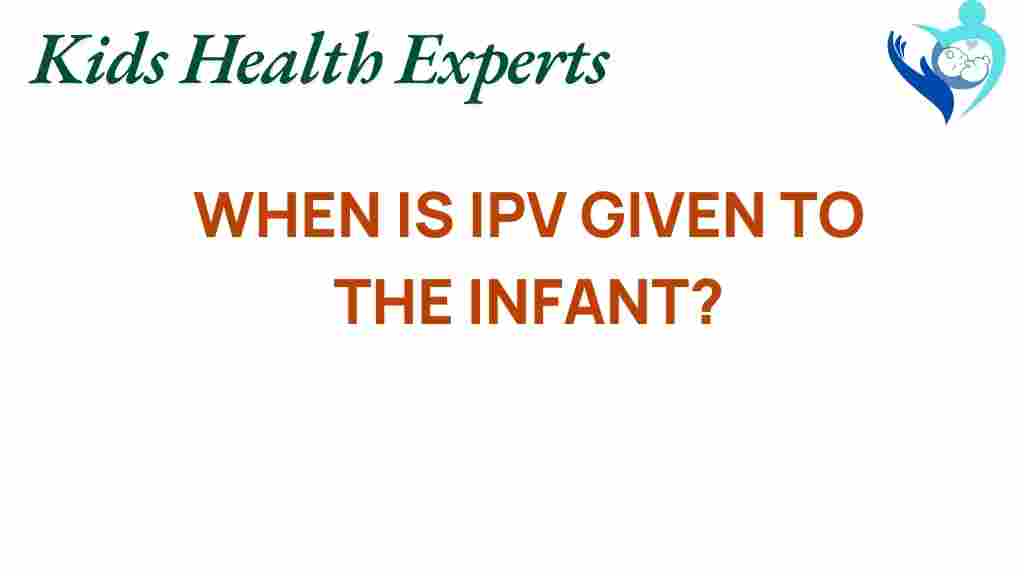Unraveling the Timing: When is IPV Given to Infants?
In the realm of pediatric care, understanding the immunization schedule is crucial for ensuring the health of infants. One of the key components of this schedule is the Inactivated Poliovirus Vaccine (IPV), which plays a significant role in protecting children from poliomyelitis, a potentially debilitating disease. This article delves into when IPV is given to infants, the health guidelines surrounding its administration, and the importance of adhering to the recommended vaccine timing.
Understanding IPV and Its Importance
The Inactivated Poliovirus Vaccine (IPV) is designed to protect against poliomyelitis, a viral infection that can lead to paralysis or even death. By immunizing infants, we reduce the risk of outbreaks and contribute to public health efforts aimed at eradicating polio worldwide.
Here are some key points about IPV:
- Type of Vaccine: IPV is an inactivated vaccine, meaning it contains killed poliovirus, making it safe for infants.
- Administration: IPV is administered through an injection, typically in the thigh or upper arm.
- Public Health Impact: Widespread vaccination has led to a dramatic decrease in polio cases globally.
The Recommended Immunization Schedule for IPV
The timing of IPV administration is critical to ensure effective immunization. According to the Centers for Disease Control and Prevention (CDC) and the World Health Organization (WHO), the IPV vaccine is given as part of a routine immunization schedule:
- First Dose: Administered at 2 months of age.
- Second Dose: Given at 4 months of age.
- Third Dose: Administered between 6 to 18 months of age.
- Booster Dose: A booster is recommended between 4 to 6 years of age.
This schedule ensures that infants receive adequate protection against poliovirus as their immune systems develop. It is essential for parents to adhere to these guidelines to ensure optimal health outcomes for their children.
Why is Vaccine Timing Important?
Vaccine timing is crucial for several reasons:
- Immune Response: Vaccines are designed to work best when given at specific ages, as the immune system is most responsive to them during these times.
- Herd Immunity: By vaccinating infants on schedule, we contribute to herd immunity, protecting those who cannot be vaccinated.
- Prevention of Outbreaks: Timely vaccination helps prevent outbreaks of vaccine-preventable diseases like polio.
Health Guidelines for IPV Administration
Health guidelines recommend that IPV be part of a combination vaccination strategy. Here are some considerations:
- Consult Pediatric Care Providers: Always speak to your child’s healthcare provider about the immunization schedule and any concerns.
- Review Medical History: Inform the healthcare provider of any allergies or previous adverse reactions to vaccines.
- Keep Records: Maintain an accurate vaccination record for your child to track their immunization status.
Common Concerns and Troubleshooting
Parents often have questions or concerns regarding infant vaccination, particularly regarding IPV. Here are some common issues and how to address them:
- Side Effects: Mild side effects may occur, such as swelling at the injection site, fever, or irritability. These are generally not serious and resolve quickly. If you have concerns, consult your pediatrician.
- Missed Doses: If a dose is missed, consult your healthcare provider for guidance on how to catch up on vaccinations.
- Vaccine Hesitancy: Engage with trusted healthcare professionals to discuss the importance of vaccination and address any fears or misconceptions.
The Role of Parents in Ensuring Timely Vaccination
As a parent or guardian, you play a vital role in your child’s health. Here are some tips to ensure your infant receives IPV and other vaccinations on time:
- Set Reminders: Use calendar alerts or smartphone apps to remind you of upcoming vaccination appointments.
- Educate Yourself: Stay informed about the immunization schedule and the importance of vaccines through reliable sources.
- Advocate for Health: Encourage other parents in your community to vaccinate their children to foster a healthier environment for all.
Conclusion: The Importance of IPV in Infant Vaccination
In summary, the Inactivated Poliovirus Vaccine (IPV) is a critical component of the immunization schedule for infants. Understanding when and why IPV is administered can help parents ensure their children are adequately protected against polio. Adhering to health guidelines, maintaining communication with healthcare providers, and advocating for timely vaccinations contribute significantly to public health.
By following the recommended vaccine timing and addressing any concerns proactively, we can collectively work towards a healthier future for our communities. For more information on vaccination schedules and guidelines, visit the CDC Vaccine Schedules page.
Stay informed, stay healthy, and ensure your child receives their IPV on time!
This article is in the category Vaccines and created by KidsHealthExperts Team
